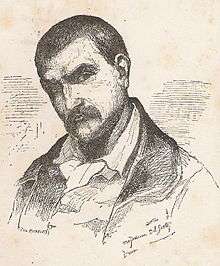Theatre studies
Theatre studies (sometimes referred to as theatrology or dramatics) is the study of theatrical performance in relation to its literary, physical, psycho-biological, sociological, and historical contexts. It is an interdisciplinary field which also encompasses the study of theatrical aesthetics and semiotics.[1] A late 20th century development in the area has been the ethnographic theory of theatre, pioneered by the Russian scholar Larisa Ivleva (1944-1995) who studied the influence of folk culture on the development of Russian theatre.[2][3]
List of theatrologists

French theatrologist François Delsarte
Because of the interdisciplinary nature of the field, those who have been described as theatrologists can vary widely in terms of the primary focus of their activities.
- Emil František Burian – writer, singer, actor, musician, composer, playwright and director[4]
- Jovan Ćirilov – philosopher, dramaturge, and writer
- François Delsarte – teacher of acting and singing[5]
- Joseph Gregor – theatre historian and opera librettist
- John Heilpern – theatre critic and essayist[6]
- Antoine Vitez – actor, director, and poet[7]
See also
References
- ↑ Helbo, André (1987). Theory of Performing Arts. John Benjamins Publishing Company, pp. 38-39. ISBN 90-272-2409-9
- ↑ Galieva, Saule (1996). Bulletin of the International Council for Traditional Music, Issues 88-93, p. 33
- ↑ Hill, John W. (2005). "Comedian of the Seventeenth Century: Ostrovskii's Dialogue with Russian Theatre History" in Text & Presentation, 2004, Stratos E. Constantinidis (ed.). McFarland, pp. 58-59. ISBN 0-7864-2205-X
- ↑ Jazz Forum (1974). International Jazz Federation, p. 19
- ↑ Horton, Andrew (1993). Inside Soviet Film Satire: Laughter with a lash. Cambridge University Press, p. 67. ISBN 0-521-43016-X
- ↑ Polish art studies, Volume 3 (1982). Zakład Narodowy im. Ossolińskich, p. 333. ISBN 83-04-00936-6
- ↑ Whitton, David (1995). Molière, Don Juan. Cambridge University Press, p. 170. ISBN 0-521-47867-7
This article is issued from Wikipedia - version of the 11/7/2016. The text is available under the Creative Commons Attribution/Share Alike but additional terms may apply for the media files.